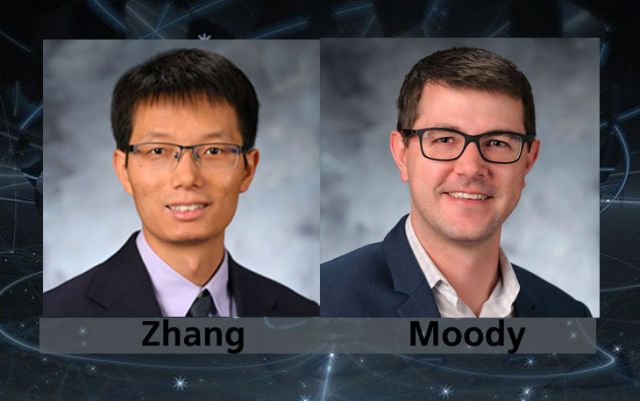IEE Funding: Zhang & Moody
ECE Professors Zheng Zhang (CE) and Galan Moody (EP) project with high-impact potential seeking to solve grand challenges of energy efficiency awarded seed funding from UCSB’s Institute for Energy Efficiency

The IEE is an interdisciplinary research institute committed to improving energy efficiency across three key themes: smart societal infrastructure, computing and communications, and the food-energy-water nexus. Each project will receive up to $50,000 in critical seed funding, which is intended to produce preliminary results that the scientists can use to apply for major external funding to expand their research.
“Supporting projects in the early stages of development is an essential step to the creation and delivery of high-impact solutions for energy efficiency,” said John Bowers, IEE director and professor of electrical and computer engineering at UCSB. “Each seed project addresses and attacks a grand challenge by taking an innovative approach that has tremendous potential. They also foster new research collaborations and leverage IEE’s legacy of scientific discovery.”
“The review committee was thrilled by the proposals in terms of how innovative they were, how the seed funding could really help the faculty move new efforts along, and how the research, if successful, could lead to additional funding opportunities,” said Mark Abel, associate director and executive advisor of IEE.
The seed grants bring the pioneering research of five assistant professors from the College of Engineering’s Mechanical Engineering and Electrical and Computer Engineering departments to the IEE.
A partnership between electrical and computer engineering assistant professors Galan Moody and Zheng Zhang will unite two emerging fields, quantum engineering and artificial intelligence (AI). Their project, “Algorithm/ Hardware Co-Design of Energy Efficient Quantum Generative Learning with Integrated Photonics,” could significantly improve the efficiency of data-intensive, and power-consuming AI tasks.
“The seed funding kickstarts a collaboration with Professor Zhang’s research group that wouldn’t really be possible otherwise. Being a newer faculty member on campus, this kind of interdisciplinary and collaborative research that is supported by the college of Engineering and IEE is exactly what made UCSB so appealing to me,” said Moody, who joined UCSB’s faculty last fall. “I’m excited to branch out from my field to learn more about how quantum science and engineering can impact other research communities, especially working with Professor Zhang, who’s an expert on tensor computation for big data and AI.”
The pair will create both an algorithm and hardware. Zhang’s group will develop and train a hardware-friendly quantum machine-learning model on classical computing hardware. Moody’s research group will design and simulate quantum hardware based on integrated photonics that can be used to implement Zhang’s model in the future. Recent advances in quantum information processing have made it possible to achieve a “quantum advantage” over classical computers, where significantly less time and energy are required to complete certain computational tasks.
“It is natural to ask whether quantum systems can provide a similar advantage for solving challenging high-dimensional and data-intensive AI tasks,” said Moody. “The development of quantum hardware for certain AI models could significantly improve the computation time, potentially enabling new applications including Internet of Things (IoT) distributed networks.”
The seed funding is supported by gifts from private donors, such as John MacFarlane, a member of the IEE Directors Council. Support from an anonymous donor allowed the IEE to award an additional grant this year.
COE News – "IEE Awards Seed Funding to Three High-Impact Efficiency Projects" (full article)